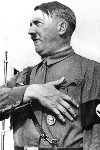How Hitler Struck at Greece and Yugoslavia
The War Illustrated, Volume 4, No. 86, Page 410, April 25, 1941.
Beyond a doubt Hitler hoped, perhaps expected, that Greece and Yugoslavia would succumb to his threats, just as Bulgaria and Rumania had done. But the two countries, small and weak though they are compared with the Axis powers, refused to be bullied, preferring to fight rather than surrender. So on April 6 the Fuhrer launched his armies against them; the great campaign of 1941 had begun.
Without troubling to declare war, the Germans invaded Yugoslavia and Greece at dawn on Sunday, April 6, 1941.
"At 5-15 this morning the German army in Bulgaria perpetrated an unprovoked attack against Greek frontier guards. Our forces are defending their national territory." So read the first communique issued by the Greek High Command on that momentous day. A few hours afterwards a second communique stated that the attack was being delivered by powerful German forces abundantly equipped with tanks, heavy artillery and aircraft, against which the Greeks could oppose only very small forces. A very violent struggle was in progress, and though the Greek fortifications resisted strongly, one at least of the frontier forts was blasted into surrender and some areas of the national territory had to be evacuated. But along the front as a whole the Germans were held up with heavy losses.
Yugoslavia’s first experience of Nazi savagery was when at 3-30 on that Sunday morning the first of many waves of German bombers appeared over Belgrade’s roofs. The capital had been declared an open city by the Yugoslav authorities, but the claim was brushed aside, and soon the German radio was gloating over the destruction caused by Nazi planes. "Our target was the military and moral nerve centre of Yugoslavia." In a short time the Stukas had turned the city into a mass of ruins, and the streets were littered with the dead bodies of women and children and old men.
After the attacks had been launched, Ribbentrop in Berlin handed Notes to the Greek and Yugoslav ministers "explaining" the German aggression. Germany and Italy had never asked more of Greece, he protested, than that she should preserve real neutrality, but she had more and more openly ranged herself with the enemies of Germany, and in particular England.
"Within the last few days Greece has openly become a theatre of operations for British forces. Large-scale operation landings and troop movements of British troops are now being carried out, and American reports confirm that a British army of 200,000 men is standing ready in Greece." So the German government had given orders to their forces to drive the British from Greek territory. Any opposition would be ruthlessly crushed, but "the German troops are not coming as enemies of the Greek people…the blow which Germany is forced to deal on Greek soil is intended for Britain."
In the note to Yugoslavia reference was made to the Three-Power Pact signed in Vienna on March 25-"an agreement which granted lasting security for the Yugoslav State, and a happy future for its people."
Yet the Yugoslav ministers who had put their signatures to the agreement were arrested on their return to Belgrade by order of "a clique of conspirators ." So, to quote the concluding sentence from Hitler’s proclamation to the German people broadcast by Gobbels at 5.a.m.that same morning, "I have decided to entrust the further representation of German interest to that force which it has again been proved is alone able to protect right and reason."
Although Hitler had known it for some weeks-the German Consul in Salonika kept him well informed of every development –the British public were surprised to hear that a British Expeditionary Force has already gone to Greece. The news was given in an official statement issued in London on the night of April 6.
"After the entry of German troops into Bulgaria had brought to a head the long threatened German invasion of the Balkans, his Majesty’s Government in the United Kingdom, in full consultation with the Dominion Governments concerned, have sent an Army to Greece, comprising of troops from Great Britain, Australia, and New Zealand, to stand in the line with the soldiers of our brave Ally in defence of their native soil. The British Airforce, which has been operating in Greece against the Italians, has been strongly reinforced."
A little later it was revealed that the new B.E.F. had reached Greece losing not a ship or a man on the way. German and Italian aircraft had altogether failed to interrupt the flow of convoys; and as for the Italian fleet-it too had made the attempt, only to permit Cape Matapan to be inscribed the roll of Britain’s victories. The expeditionary force included Australians, New Zealanders, and other veterans of the Libyan campaign, and their reception in Greece was enthusiastic beyond description.
The German masses which crossed the Greek frontier from Bulgaria met with the most determined resistance from the Greek troops, particularly in the Struma valley. Here and there the Greek forts were overwhelmed by the German armoured hordes and fell, having resisted to the last; but others managed to beat off every attacked. Elsewhere, however, the battle was not going so well for the defenders. In order to avoid unnecessary sacrifice, western Thrace was evacuated according to plan, with the result that the Germans on April 7 reached the Aegean, thus cutting off Greece from land communication with Turkey. Then just west of Struma Valley where the frontiers of Yugoslavia, Greece and Bulgaria meet, the Yugoslav army was forced to withdraw in front of great German pressure, thus leaving the Greek left flank uncovered. Seizing their advantage a German mechanized division penetrated the mountainous region to the east of Vardar and swooped down on the Greek town of Doiran. For many hours a small Greek mechanized formation strove heroically to slow down the enemy advance, but finally the Germans succeeded in advancing dangerously far down the Vardar valley in the direction of Salonika.
Meanwhile, what of the war in Yugoslavia? The first communique of the Yugoslav High Command, broadcast over the Belgrade wireless on April 8, said that on all fronts the situation was in the Yugoslav’s favour and that the enemy attacks were being repulsed with the greatest vigour. The Germans were invading the country from Hungary, Rumania and Bulgaria, the principal thrust being the third, aimed at separating the Yugoslavs from their Greek allies, and by April 9 the Germans claimed that with both Nish and Skoplje (Uskub) in their hands and the Albanian frontier reached, this had been accomplished.
But the principle struggle was between the Greeks and Germans at the Struma Pass. Even the German official spokesman was constrained to admit that the Greeks were fighting courageously, but the weight of men and metal soon began to tell. Greek resistance was thrust aside and a German mechanized division thundered into Solonika at 4 a.m. on April 9.
Greeks! We shall win! King George of the Hellenes' Message to the Greek People
Greeks! A new enemy this morning insulted the honour of our country. With no worning, at the same moment as the German Government handed the Greek Government a document simply announcing their action, German troops attacked our frontiers.
Our heroic army, watchful guardian of the sacred soil of our country, is already defending it with its blood.
Greek! The Green people, who have proved to the world that they rank honour above everything else, will defend it against this new enemy to the end. Attacked today by yet another empire, Greece, so small, is at the same time so great that she will allow no one to touch her.
Our struggle will be hard and without mercy. We shall not be afraid. We shall bear all our sufferings, and shall not shrink from any sacrifice, but victory is waiting for us at the end of the road, to crown Greece once again and for all time.
We have at our side powerful allies - the British Empire with its indomitable will, and the United States of America with the inexhaustible resources. On the battlefield we are fighting side by side with our Yugoslav brothers, who are shedding their blood with us for the salvation of the whole Balkan Peninsula and of humanity.
We shall win with the help of God and the benediction of the Holy Virgin. Yes, we shall win! The history of the nations will once again have to write that the country renowned for Marathon and Salamis does not waver, does not submit, does not surrender.
All together, Greeks, men, women and children, stand erect, clench your fists and be at my side the defenders of the Greek motherland of yesterday, of today and of tomorrow, worthy of your ancestors, an example to your descendants, defenders of the freedom which has sprung from the sacred bones of the Greeks.
Forward, Children of Hellas, for the supreme struggle, for your altars and your hearths! - George II
We shall resist and win. - General Papagos, Greek C.-in-C.
Our motto remains the same: "Disdain Death." - M. Papavassiliou, Greek Minister of Marine
Index
Previous article
How the Yugoslav Nation Found Its Soul
The first news of the Yugoslav revolution was given to the world by Mr. Churchill in a speech in London on the morning of March 28. "I have great news for you and the whole country", the Prime Ministe
Next article
South Africans Won the Race to Addis Ababa
With dramatic suddenness, Addis Ababa, Haile Selassie's former capital and since 1936 the capital of the Italian Empire in East Africa, capitulated to the British on April 5. The story of its fall is





